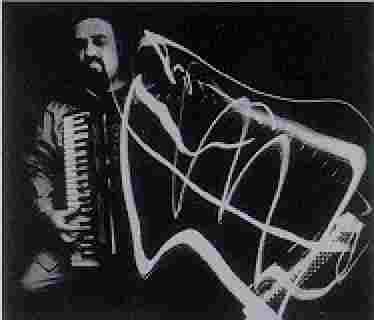The Free-Reed Review
Articles and Essays Featuring Classical Free-Reed Instruments and Performers
Interview with William Schimmel

Doktorski: What is the significance of the title "Dead End Ave."? Is it significant?
Schimmel: "Dead End Avenue" is a place where accordion culture is defined. It's very real and contains a wide array of society types - all significant - all valid.
Doktorski: The liner notes are very clever; you defy traditional categorization and analysis of your music. "We construct our shrines; we de-construct our shrines. Nothing is too sacred.. everything is sacred..." Is this simply a nonsensical play on words or does it stem from a deeper philosophy of life? If so, what is that philosophy and how does one live it? Do you live it?
Schimmel: It stems from a deeper philosophy of life. It makes no pat assumptions about anything whatsoever. It's not a movement or anything like "world music etc" (which is rather specific due to it's packaging). It's a bit messy due to the fact that it's all-inclusive.
Pietro Deiro Jr. stated recently that the original purpose of the American Accordionists' Association was to "avoid chaos" - perfectly reasonable. As "Artist-In-Residence" of the American Accordionists' Association, I want to address as many accordion issues as I can. This involves dealing with chaos, the nice and not-so-nice. Maybe chaos will resolve itself at some point, but for now I'm enjoying the mess.
Doktorski: It seems to me that your music incorporates a good deal of improvisation. Do you write on paper the notes of your pieces, or just sketches, or none of the above?
Schimmel: All of the pieces are scored: some using conventional notation and some using a form of graphic or "dharmic" notation, including drawings and face pictures to deal with a psychological state of mind. I use whatever it takes to perform them not excluding improvisation. The final process goes through an elaborate dramatization by my wife and collaborator dancer/ director/ choreographer Micki Goodman. The music will change somewhat at this level, due to the fact that it's now in three-dimensional space and a "film-like" fourth dimension - like a movie. Our show, "Dead End Ave.," is just that!
Doktorski: In the liner notes you write, "all of the pieces on this recording are de-ranged." Does the listener also have to be de-ranged to appreciate your music? Will "normal" average accordion lovers be able to comprehend your "realities?" What type of person will best be able to appreciate this album? Do you have any suggestions for the ordinary run-of-the-mill Lawrence-Welk-lovers type of folk who might not understand what to make of this album?
Schimmel: If being "normal" or "average" entails a narrow spectrum, I would say that the de-ranged have an advantage. I feel that it's for anyone who takes the time to experience it. I find that if one stays with it from beginning to end, there will be something invariably that he or she will like. It's really a matter of staying with it.
I'm a Lawrence Welk lover myself! I never met an ordinary run-of-the-mill Lawrence Welk lover! I've been referred to as the "Subversive Lawrence Welk" and the "Anti-Truth." I've even written a book "Learning from Lawrence Welk" where I refer to Welk as our "Appollo." I hope all of this helps in the interpretation of the album.
Doktorski: Now about you! Tell us a little about your musical training. Was accordion your first instrument? Do you play other instruments? Do you think your training (including Julliard) adequately prepared you for musical life in the "real" world? What is your favorite activity? What words of advice to you have for young accordionists in our audience?
Schimmel: I was trained initially on the piano, starting at age five. My mother was my first teacher. In a few years I could play easy Beethoven, Clementi, etc. well enough to perform for friends, relatives, etc. I didn't enjoy it much because no-one seemed to be having fun.
Then my uncles would arrive with their accordions and all hell would break loose: dancing, eating, drinking, cigar smoking, poker playing - real fun! I knew from then on how I wanted to spend the rest of my life. I was ten then!
My accordion teacher was Dr. Jacob C. Neupauer. I graduated from Neupauer Conservatory with a diploma and have received my bachelors of music, master of science and doctor of musical arts (in composition) degree from the Julliard School. I finished my formal education with a doctorate in 1973.
Is anyone actually prepared for the "real" world? I'm grateful to have had such a thorough training: with Dr. Neupauer, the Juilliard pedigree and the Silva Mind Control Course which is all about the right brain.
My favorite activity is working with Micki. We met at Juilliard. Come visit us on Dead End Avenue!